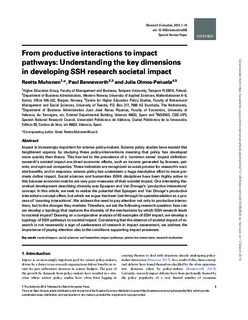| dc.contributor.author | Muhonen, Reetta | |
| dc.contributor.author | Benneworth, Paul | |
| dc.contributor.author | Olmos-Penuela, Julia | |
| dc.date.accessioned | 2019-03-13T08:17:30Z | |
| dc.date.available | 2019-03-13T08:17:30Z | |
| dc.date.created | 2019-03-12T10:22:34Z | |
| dc.date.issued | 2019 | |
| dc.identifier.citation | Muhonen, R., Benneworth, P., & Olmos-Peñuela, J. (2019). From productive interactions to impact pathways: Understanding the key dimensions in developing SSH research societal impact. Research Evaluation, 2019. | nb_NO |
| dc.identifier.issn | 0958-2029 | |
| dc.identifier.uri | http://hdl.handle.net/11250/2589783 | |
| dc.description.abstract | Impact is increasingly important for science policy-makers. Science policy studies have reacted this heightened urgency by studying these policy-interventions meaning that policy has developed more quickly than theory. This has led to the prevalence of a ‘common sense’ impact definition: research’s societal impact are direct economic effects, such as income generated by licenses, patents, and spin-out companies. These indicators are recognized as weak proxies for research’s societal benefits, and in response, science policy has undertaken a huge descriptive effort to more precisely define impact. Social sciences and humanities (SSH) disciplines have been highly active in this because economic metrics are very poor measures of their societal impact. One interesting theoretical development describing diversity was Spaapen and Van Drooge’s ‘productive interactions’ concept. In this article, we seek to realize the potential that Spaapen and Van Drooge’s productive interactions concept offers, but which we argue has been lost through its operationaliation as a process of ‘counting interactions’. We address the need to pay attention not only to productive interactions, but to the changes they mediate. Therefore, we ask the following research question: how can we develop a typology that captures the diversity of the mechanisms by which SSH research leads to societal impact? Drawing on a comparative analysis of 60 examples of SSH impact, we develop a typology of SSH pathways to societal impact. Considering that the absence of societal impact of research is not necessarily a sign of uselessness of research in impact assessment, we address the importance of paying attention also to the conditions supporting impact processes. | nb_NO |
| dc.language.iso | eng | nb_NO |
| dc.publisher | Oxford University Press | nb_NO |
| dc.rights | Navngivelse 4.0 Internasjonal | * |
| dc.rights.uri | http://creativecommons.org/licenses/by/4.0/deed.no | * |
| dc.subject | societal impact | nb_NO |
| dc.subject | social sciences and humanities | nb_NO |
| dc.subject | impact pathways | nb_NO |
| dc.subject | productive interactions | nb_NO |
| dc.subject | research evaluation | nb_NO |
| dc.title | From productive interactions to impact pathways: Understanding the key dimensions in developing SSH research societal impact | nb_NO |
| dc.type | Journal article | nb_NO |
| dc.type | Peer reviewed | nb_NO |
| dc.description.version | publishedVersion | nb_NO |
| dc.rights.holder | © The Author(s) 2019. | nb_NO |
| dc.subject.nsi | VDP::Samfunnsvitenskap: 200::Økonomi: 210 | nb_NO |
| dc.source.pagenumber | 14 | nb_NO |
| dc.source.journal | Research Evaluation | nb_NO |
| dc.identifier.doi | 10.1093/reseval/rvz003 | |
| dc.identifier.cristin | 1683996 | |
| cristin.unitcode | 203,13,3,0 | |
| cristin.unitname | Institutt for økonomi og administrasjon | |
| cristin.ispublished | true | |
| cristin.fulltext | original | |
| cristin.qualitycode | 1 | |

